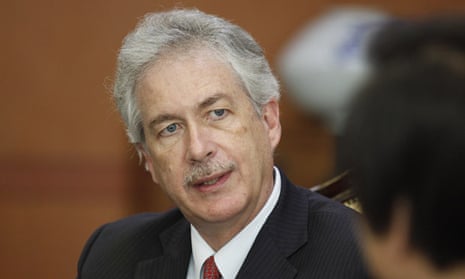The US announced on Saturday that it is sending two top negotiators to Geneva for direct talks with Iranian officials over Tehran's nuclear programme.
The discussions involving deputy secretary of state William Burns and undersecretary of state for political affairs Wendy Sherman are set for Monday and Tuesday.
An interim deal reached in November by Iran and six world powers – the US, Russia, China, Britain, France and Germany – limited Iran's uranium enrichment programme. In exchange, some penalties imposed against Iran were eased. But sanctions such as those targeting Iran's oil imports, have remained in place.
Those nuclear talks are scheduled to resume 16 June. There is an informal deadline of 20 July for a comprehensive deal.
Iran's official IRNA news agency said the upcoming US talks would be followed by separate discussions in Rome between Iranian and Russian officials on Tuesday and Wednesday. IRNA quoted Abbas Araqchi, a senior member of Iran's nuclear negotiating team, as saying that the Islamic Republic planned to hold other bilateral talks as well with the other world powers, but those meetings had yet to be set.
Iran insists its program is for peaceful energy and medical research purposes. Much of the world fears Iran may be trying to develop nuclear weapons.
The new face-to-face talks come as the deadline approaches for world powers and Iran to translate their interim nuclear agreement into a comprehensive deal.
Talks have focused on restricting Iran's uranium enrichment and eliminating the possibility of it producing plutonium that can be used in warheads. In exchange, the US and others would ease penalties that have crimped Iran's economy.
International inspectors would monitor Iran to ensure it doesn't ramp up activities to reach a nuclear weapons capability.
Negotiators hope to clinch the agreement by 20 July, but can extend the current interim arrangement for an additional six months.
That deal, reached in broad terms in November and implemented in January, provided Iran up to $7bn in eased trading conditions for several nuclear concessions.
The Associated Press reported at the time that the compromise resulted from a series of secret meetings between US and Iranian officials. The talks took place in the Middle East sultanate of Oman and elsewhere going back to 2012. They only really heated up with the election of Iran's moderate president, Hassan Rouhani in the summer of 2013.
Burns and Jake Sullivan, vice-president Joe Biden's top foreign policy adviser, were part of the original back-channel team. Sherman joined them as the American and Iranian negotiators began to make progress on nuclear matters.
Sullivan is expected to participate in the upcoming sessions in Geneva.

Comments (…)
Sign in or create your Guardian account to join the discussion